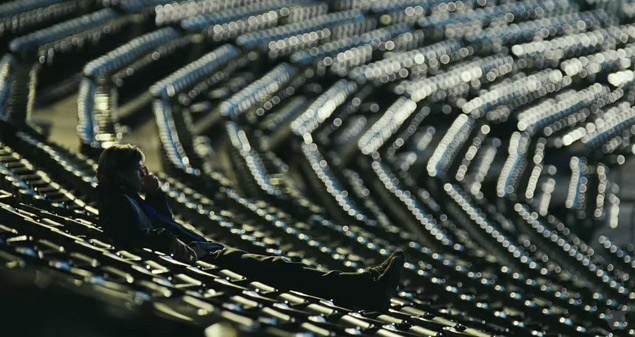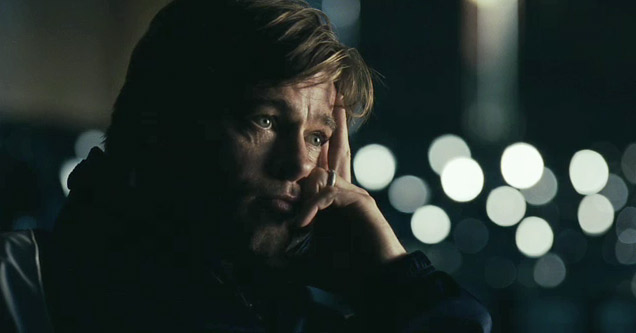Moneyball is an instant contradiction, a fine humanistic film championing an innovative but dehumanizing method of team-building, reducing all star athletes to statistical equations. The film has two stories to tell, that of a middle-aged man finally making his mark on the game he was supposed to rule in his youth, and the reinvention of baseball management to achieve a more equitable playing field with or without mega-funds.

The story begins after a disheartening loss for the Oakland Athletics. The humiliation is compounded by the loss of three star players who the A's don't have sufficient money to replace. General Manager Billy Beane (Brad Pitt) butts heads with owners trying to get more money and with his own management staff who are entirely resistant to innovative thinking. Enter young economics / statistics master Peter Brand (Jonah Hill moving up to the majors?) who frees up Billy's mind with his theories on why so many players are over and undervalued. They begin to make controversial and provocative changes which mystify or anger the baseball powers that be including their own team's manager Art (well played by Philip Seymour Hoffman).
There's a smart visual well into Moneyball's first act in which huge banners of the A's three lost stars are dropped from their places of honor crumpling as they hit the ground like the deflating egos of management. Billy takes the leap of faith with Peter and they rebuild with new players, a team of misfit toys, who are all undervalued (or not valued at all). Shortly afterwards, when we see the stadium again, there is only one banner trumpeting one of the League's oldest fan-beloved players David Justice (Stephen Bishop) whose glory days are far behind him.
Moneyball's solid screenplay (by Oscar winners Aaron Sorkin and Steven Zaillian) has a good joke at the expense of metaphors but I can't resist this one. For all of Moneyball's strengths, from a solid cast with vivid cameos (Reed Diamond from Dollhouse is superb in a one-scene face/off with Brad Pitt) to able and sharp direction (Bennett Miller of Capote fame) and editing (which skims veritable mountains of statistical information, old footage, and emotional backstory) it really all comes down to one star banner: Brad Pitt unfurled.

I've been in this game a long time."
Yes, you have Brad Pitt, yes you have.
In his two decades of stardom, Pitt's best work has generally happened within three types: weirdos he attacked with gleeful creative gusto (Tyler Durden, Jeffrey Goines, Chad Feldheimer), strutting men that basked in their own golden light (J.D., Rusty and Paul McLean), and family men with wounded machismo (Mr O' Brien and Detective Mills); In Billy Beane, all of Pitt's strengths coalesce as if he'd been in training for this one. He's loosely idiosyncratic and funny (that goofy business after a "good talk" with the humorless Art is just wonderfully endearing detail), he harnesses his potent movie star charisma with weary grace playing a man who, unlike himself, didn't live up to his golden boy promise, and in scene after scene but particularly when visiting with his teenage daughter, he lets his worried humanity show; he feels like a failure and this daring move is his last shot at glory.
Brad Pitt's shiny star turn is so good, in fact, that it neatly blinds you to the film's minor flaws. No one, including the man himself, is reinventing the wheel here and for all the star light that Pitt gives off, the film doesn't use any of it to fill in poorly lit corners. It raises but never addresses troubling side issues like what to do with the understandable revulsion that greets the dehumanization of players (exarcebated by so few of the players having distinct personalities) and it has a strange inability to flesh out the important side story of Art's insistence on managing the team in opposition to Billy's plans. The scene wherein Art finally capitulates to a different way of thinking would be a superb bit of economic storytelling in most films but here, given the underlit subplot, it feels like not enough as a wrap-up.
Billy continually worries that all of his accomplishments will be dismissed if he loses the final game of the season. The film needn't worry about the same thing. The final game here is a beautifully elongated nearly sports-free quietitude while Billy merely contemplates his options and a coda that works as a reprise of one of the sweetest earlier scenes with tenderness and even gently needling humor as the credits begin to roll. Late in the film we're told "you can't help but romanticize baseball" and it rang so true, even to me! I don't know the first thing about baseball, nor do I care to, but I was nodding my head like some dreamer in the bleachers waiting to catch that fly ball. B+

 Oscar Notes: It's rare when late August / early September hype survives intact the following February but (for now) it's looking like this may well be the golden year for Hollywood's golden god. In the past I've stated that Brad would never win until he was in his 60s (they make the adonises wait) but I'll quite happily be proven wrong since I've been on Brad's team for twenty years. Beyond Pitt's likely nomination (a third... and easily his most deserving since Oscar's idea of his "best" work is suspect.) I think you can safely bet on Moneyball's statistical scrappiness factoring into several categories barring those generally reserved for eye candy films. In short: we need to update our prediction charts.
Oscar Notes: It's rare when late August / early September hype survives intact the following February but (for now) it's looking like this may well be the golden year for Hollywood's golden god. In the past I've stated that Brad would never win until he was in his 60s (they make the adonises wait) but I'll quite happily be proven wrong since I've been on Brad's team for twenty years. Beyond Pitt's likely nomination (a third... and easily his most deserving since Oscar's idea of his "best" work is suspect.) I think you can safely bet on Moneyball's statistical scrappiness factoring into several categories barring those generally reserved for eye candy films. In short: we need to update our prediction charts.